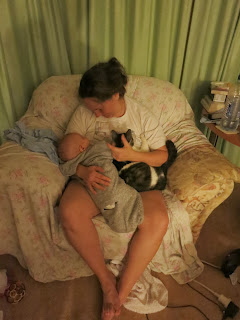It's been a while!
As requested, this blog is sharing notes on pregnancy and nutrition for those who are interested. But first an update :)
 |
| With Grandma Helen |
 |
| With Mum |
Our son Reuben John Longhurst was born 7th March 2013. At 10 pound 4 or 4.65kg he was a
big baby.
 |
| Getting a kiss |
|
 |
| Content | |
Our family friend Jeanette Paterson (midwife) came to our home first and then travelled to the Family Birth Centre with us... with a wonderful light massage on the belly for each contraction I was truly blessed to have her with us. I was able to stay calm and had a very good labour ('the baby making machine').
My tips are; healthy and control your breathing to a nice calm slow rate while imagining yourself in a happy place like the beach.
We only had one hiccup (and it might have been just that!)... Reuben did a poo in his waters and then inhaled it! Doh! At 40 weeks and two days, merconium in the water is common.
 |
| About two days old, in hospital being observed after merconium inhalation which proved to be no problem for such a lovely healthy baby |
A big thank you to Kay Whyte of
Ecology Medicine, who is an old friend from Subiaco Church of Christ and also a nutritionist, midwife and nurse. I found that she could resolve any problem I had during pregnancy and leave me feeling pretty good the whole way along. This post will sum up most of her advice for those who might care to copy. She has not approved this blog and I recommend that you have a consultation with her before taking any of the more particular supplements, or high doses.
In the early stages, before getting pregnant, it is wise to dramatically reduce the following (total exclusion is best):
- sugar
- alcohol
- additives, preservatives and other chemicals in your food.
 |
| Gallavanting at Joni and Jethro's party (about 4-5 months pregnant?) |
|
If you have been on any medication, including the pill... you can consult with a nutritionist to see about compensating for this strain on your body. Chances are that you will have some areas of weakness, B6 or B12 possibly. You'd be wise to sort this out before you get pregnant and try your best to avoid the associated morning sickness, fatigue, feeling teary, poor sugar metabolism and potentially even miscarriage that can result from these deficiencies.
 |
| Baby Shower, l to r, Granny, Annora, G'ma Dot, Grandma Helen |
|
This is what I used:
- Either Antiox C or Respiratory Formulae approx 2-4 tablets (to gut tolerance)
- Mineral B Formulae approx 2-4 caps but more towards the end of pregnancy
- Orthoplex Heme 100 which includes folic acid, iron and a few other goodies
- Orthoplex Activated B6 only to treat nausea (I had a little post-flu)
- Spirulina - more depending on whether you are having breathlessness
- Biodynamic staples including flour (
Eden Valley) and milk (prefer
Demeter certified if possible)
- plenty of organic olive oil and olives (no preservatives)
- plenty of meat and salads, preferably organic but I would often not worry about this.
 |
| Duck with Orange, salad, roast vegies |
I made a modified sprouted seed bread with soaked seeds, biodynamic flour and a sugar free bread mix (order from
here).
 |
| Baby Shower, feeling fine! |
Your recipe might be better than mine so I won't share here. Get
online and see what you think. Sprouting is a great idea as it makes the nutrients more bioavailable... including seeds is a great idea for Vitamin E (makes for a good labour and strong baby)... using organic and preferably biodynamic is a great idea too!
I would use
coconut oil which helps to keep the bread fresh for longer, but note that not all brands are created equal. In warmer weather, when the oil has melted in the glass jar, look for a colourless liquid with no yellow tinge. After the baby is born, you may prefer to avoid rye and pumpkin seeds, which can be harder to digest for some.
Going sugar free is a very good idea. You'll feel stronger and better for it.
Early in pregnancy I had minor bleeding and Kay gave me a dose of B12 and the problem resolved plus I felt better emotionally and my eyes sparkled more ;)
At one stage I encountered a few days when I had some problems with my memory, having trouble remembering to take my glass from the study to the kitchen to get a drink! Kay immediately put me on zinc and the problem resolved itself. I was able to continue to consult and use my brain until the last weeks of pregnancy. Zinc deficiency shows as white spots on fingernails, it is deficiency in Western Australian soils.
Regarding seafood, please be very careful! Fukishima is a problem!
So, don't eat any tuna... at least. I stuck to salmon and red snapper, which are both low in mercury and good.
Particularly towards the end of pregnancy, Vitamin E (olive oil) and magnesium become important for a good labour and strong baby. Magnesium should not be over-supplemented as it can delay labour... but do get enough to not swell up terribly like a balloon... hommus, sprouts (do them yourself for safety) and greens.
For labour, Kay recommended an organic lemonade if I needed a boost and said for a long labour, I might need some Vitamin C if I felt fatigued... my labour was less than 12 hours long and I felt fine. Rodney tried to feed me a bit of banana but I wasn't keen.
 |
| About three months old |
We almost had a perfect water birth, but there was merconium in my waters... so off we trotted to King Edwards. All up, a very good experience :) Water births rock.
 |
| About five months old, playing peek-a-boo |




























